Senior ministry officials driving transformation in Sri Lanka’s tax administration are drawing valuable lessons from Singapore’s public sector transformation and service excellence at eGL.
The Sri Lankan government has embarked on an ambitious programme since 2009 to enhance the delivery of public services. Supporting this objective is a comprehensive rollout plan, and a human resource capacity development initiative to equip officials from Inland Revenue Department (IRD) with the necessary knowledge and techniques to undertake this journey. These senior officers will be responsible for rolling out sophisticated applications such as the Revenue Administration Management Information System (RAMIS) and Integrated Treasury Management Information System (ITMIS) in Sri Lanka.
The Singapore eGovernment Leadership Centre (eGL) was engaged in January 2013 to impart the transformation training to 180 senior officers from IRD, Ministry of Finance and Planning (MoFP), Sri Lanka, over a period of ten months.
Impetus for transformation
Mrs H.M.N.S. Gunawardana, Director General of the Department of Legal Affairs at MoFP shared, “Right now, what Sri Lanka requires is a system of tax administration that would help our revenue agencies including IRD, Customs, Excise, Import and Export departments achieve improved fiscal management. As the apex institution in these administrative reforms, MoFP’s objective is to be able to continue supporting public expenditure, which would be crucial to driving Sri Lanka’s economic growth.”

Mrs H.M.N.S. Gunawardana, Director General of the Department of Legal Affairs at MoFP (right)
and Mr Ashok Kumar, eGL Centre Director
While the doubling of per capita income from US$1,600 in 2007 to US$2,900 in 2012 has been a good barometer of Sri Lanka’s development and prosperity, the country will need both “the hardware and software” in order to optimise its tax revenues. “Our priority is to address system requirements for high-volume tax bases. We will also be focusing on related processes at provincial levels,” Mrs Gunawardana added.
Identifying the enablers for transformation
eGL Centre Director, Mr Ashok Kumar, pointed out that eGL has carefully designed a training curriculum comprising a combination of lectures, workshops, discussions and site visits to provide participants with an interactive, experiential learning environment. The objective was to equip them with the relevant skills to actively participate and contribute to the transformation initiatives back home. “We’ve worked closely with the project team in Sri Lanka to ensure that the content remains relevant and the lessons learnt can be applied to the Sri Lankan context,” he said.
Complementing eGL’s training programme on change management in Singapore is a programme on strategy and policy formulation, covered by eGL stakeholder, the Lee Kuan Yew School of Public Policy.
Setting the stage for mindset change
“You could say that Singapore’s ‘unique flavour’ and success stories were the factors which drew us here,” Mrs Gunawardana said. The other push factor was the ongoing Government-to-Government exchanges and collaboration between Sri Lanka and Singapore.
She had particularly enjoyed the participative nature of eGL’s training curriculum, which focused on infocomm related aspects, including change management. “The lecturers were well-blended with workshops and discussions,” she observed.
Mrs Gunawardana was also highly impressed by the customer service experience and degree of e-enablement during the field visits to Singapore’s Inland Revenue Authority and National Library Board. All in all, she believes that the exposure, interaction and engagement will spark lasting mindset changes among the course participants.
This article is first published in NUS-ISS quarterly e-newsletter, Issue 5 (Jan-Mar 2014).